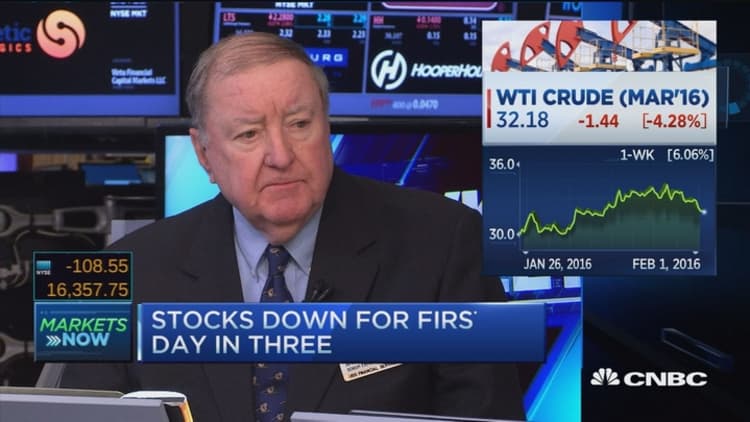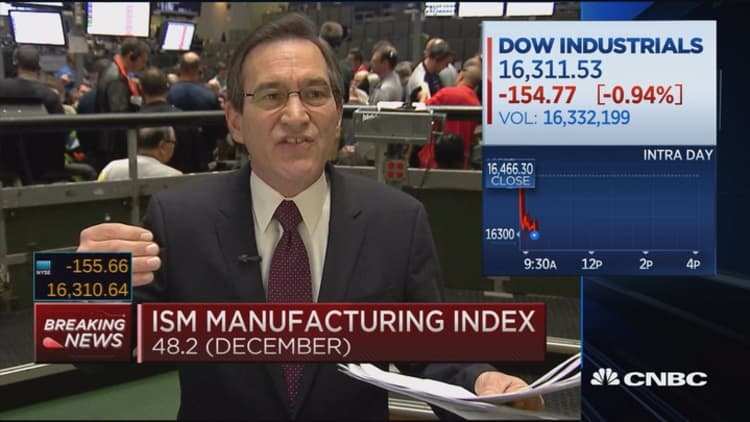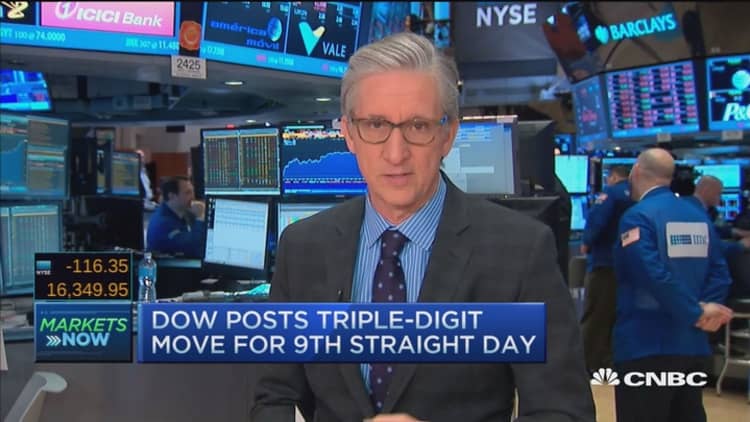


U.S. stocks closed narrowly mixed Monday, stabilizing on the first trading day of February, despite declines in oil prices and soft China manufacturing data. (Tweet This)
The Nasdaq composite closed higher as Facebook extended recent gains and shares of Alphabet rose ahead of its earnings report, due after the close.
Hopes of more accommodative Fed policy following Fed Vice Chair Stanley Fischer's afternoon remarks also helped the major averages end well off session lows.
The major averages pared initial losses of more than 1 percent to turn higher in the last hour of trade, but the Dow Jones industrial average and the S&P 500 closed a touch lower.
Utilities closed 1 percent higher to lead S&P 500 advancers, followed by telecommunications.
"The market has a real defensive feel to it," said Marc Chaikin, CEO of Chaikin Analytics.
"I think it's a way to put money to work in high yielding stocks and not having to deal with the volatility around earnings reports," he said.
Year-to-date performance
The Dow Jones industrial average closed about 17 points lower. The index earlier added more than 40 points, more than recovering from a 150-point intraday decline following another sub-50 print in ISM manufacturing. 3M, Goldman Sachs and energy firms Exxon Mobil and Chevron were the greatest weights on the Dow, while Boeing and American Express were the top contributors to gains in the close.
The Dow transports reversed an earlier decline close up 0.9 percent as JetBlue led advancers.
U.S. crude oil futures settled at $31.62 a barrel, down $2, or 5.95 percent, for its worst daily loss since Sept. 1. Looking at the last 15 days, the correlation between U.S. crude oil futures and the S&P 500 fell from 0.96 to 0.6 Monday, according to analysis using the thinkorswim platform.
"The fact that markets are coming up (from lows) with oil coming down even more this morning is somewhat unusual," said Ben Pace, chief investment officer at HPM Partners.
"I think what people are keying into now is continued incremental easing around global central banks, even incremental easing by the Fed...almost to the point that weak economic statistics, if they're not shockingly weak, could mean the Fed (will not) tighten as much," he said.
Read MoreCashin: Others doing Fed's tightening for it
"I don't know if you can exactly point to one catalyst or another, but Fischer in my opinion did plant the seeds to walk back four rate hikes,' said John Caruso, senior market strategist at RJO Futures.
Federal Reserve Vice Chairman Stanley Fischer said that if recent volatility in global asset markets leads to "a persistent tightening of financial conditions, they could signal a slowing in the global economy that could affect growth and inflation in the United States. But we have seen similar periods of volatility in recent years that have left little permanent imprint on the economy."
Fischer also said "we simply do not know" what the Fed will do at the next policy meeting. He added that economic conditions are expected to warrant only gradual rate increases.
"Fischer certainly helps," said Art Hogan, chief market strategist at Wunderlich Securities.
"There's no pre-set plan coming out of the December meeting," Hogan said. "We thought there was a pre-set plan."
Stocks initially held near earlier levels, before creeping towards the unchanged level. Treasury yields edged higher, with the at 0.80 percent and the 10-year yield at 1.95 percent.
The U.S. dollar index held more than about half a percent lower against major world currencies, with the euro near $1.09 and the yen at 120.96 yen against the greenback.
Earlier, European Central Bank President Mario Draghi reiterated in a speech the central bank will review and reconsider its policy stance in March.
The Bank of Japan surprised markets Friday by adopting a negative interest rate policy.
"I think (the recovery from session lows in stocks) has to do with the short squeeze hangover from Friday," said JJ Kinahan, chief strategist at TD Ameritrade.
Traders also attributed some of the recovery to beginning-of-month inflows and some optimism on consumer spending as some consumer stocks tried for gains.
The ISM manufacturing index for January came in at 48.2, below the 50 expansion-contraction line for a fourth-straight month. Construction spending rose 0.1 percent in December.
"I don't read too much into it. There's a lot of data this week. What I do read into it is the Fed's going to have quite a fight in wanting to raise interest rates again this year," said Peter Boockvar, chief market analyst at The Lindsey Group.
Spot gold extended gains after the data to top last week's high and hit $1,129.50 an ounce, its highest since Nov. 3.
The S&P 500 briefly fell more than 1 percent as energy declined more than 2.5 percent in morning trade as the greatest laggard. The sector later pared losses to end down 1.87 percent.
"Obviously it's all about oil again, leading the market lower," said Peter Cardillo, chief market economist at First Standard Financial. He attributed much of the declines in oil to profit taking after crude's four-day win streak last week.
Oil fell under pressure from weak economic data from China and news that an OPEC source played down talk of an emergency meeting.
Softer-than-expected Chinese data set a negative tone overnight. The official manufacturing PMI for January fell to 49.4, the weakest read since August 2012 and marking a six-straight month of contraction. The official non-manufacturing PMI fell to 53.5 in January from 54.4 the prior month.
The Caixin manufacturing PMI also remained in contraction territory but edged up to 48.4. Caixin's non-manufacturing PMI report is due before the Wednesday trading session in the United States.
The People's Bank of China set the Chinese yuan midpoint fix against the dollar weaker for the first time in seven sessions, at 6.5539 versus 6.5516 Friday.
Markit's U.S. Manufacturing PMI for January came in at 52.4, a touch below the flash read but above December's final 51.2 print.
Read MoreEarnings, jobs will drive stocks
Earlier, personal income for December showed a 0.3 percent increase. Consumer spending was unchanged for the month, while November spending was revised higher to 0.5 percent.
Excluding food and energy, prices were unchanged after rising 0.2 percent in November, Reuters said. The so-called core PCE price index increased 1.4 percent in the 12 months through December after a similar gain in November. Core PCE is the Federal Reserve's preferred inflation measure and remains well below the U.S. central bank's 2 percent target.
"Certainly the data today did not help either the bulls or the bears in terms of where the economy is going. For those who want to go into the market they're waiting for more confirmation (of economic growth). They need to be shown. Friday will help, especially if we see wage growth moving higher," said Quincy Krosby, market strategist at Prudential Financial.
"Not everyone can keep cash, but those who are keeping cash are looking for an even better entry point," she said.
The major economic report for the week is the January nonfarm payrolls report, due Friday.
Monday brings more major earnings reports, including Google's parent company Alphabet after the close. Both classes of the stock closed up 1.2 percent.
In morning quarterly reports, Aetna earned an adjusted $1.37 per share for its latest quarter, 16 cents above estimates, with revenue also beating forecasts. The health insurer was helped by improved membership numbers and margins in its Medicare business. However, it is also projecting full year 2016 earnings of $7.75 per share, below estimates of $8.05 a share. The stock closed up 1.5 percent.
Cardinal Health closed down 1.9 percent despite posting earnings that beat on both the top and bottom line, helped by factors such as growth in its customer base and solid fundamentals.
Facebook closed up 2.57 percent at a record, after earlier setting a fresh intraday high. The stock is up nearly 10 percent year-to-date, extending recent gains on earnings last week that blew past estimates.
"Facebook hands down is the strongest stock that's emerged from earnings. … You need to see new leadership emerge," said Adam Sarhan, CEO of Sarhan Capital. At the time of publication, his clients had a long exposure to Facebook.
Twitter closed up 6.6 percent for its best day since October 7 after The Information's Jessica Lessin, a CNBC contributor, reported that investor Marc Andreessen and Silver Lake Partners have considered a deal for Twitter. Shares of the company are down more than 20 percent year-to-date.
Read MoreEarly movers: AET, STR, CAH, TWTR, RH, BX, MNST, AAL, YHOO & more
European stocks trimmed losses but held lower as oil's decline and China data weighed.
Asian stocks closed mixed, with the Nikkei 225 nearly 2 percent higher but the Shanghai composite down more than 1.5 percent and the Hang Seng off about half a percent.
U.S. stocks closed more than 2 percent higher Friday, the last trading day of January, after the Bank of Japan unexpectedly adopted a negative interest rate policy for the first time. However, the major averages still posted their worst January in at least seven years.
Major U.S. Indexes
On Monday, the Dow Jones industrial average closed down 17.12 points, or 0.10 percent, at 16,449.18, with Exxon Mobil the greatest laggard and American Express the top advancer.
The closed down 0.86 points, or 0.04 percent, to 1,939.38, with utilities leading seven sectors higher and energy, financials and industrials the only decliners.
The Nasdaq composite closed up 6.41 points, or 0.14 percent, at 4,620.37. Apple closed down 0.93 percent, while the iShares Nasdaq Biotechnology ETF (IBB) closed about half a percent higher.
The CBOE Volatility Index (VIX), widely considered the best gauge of fear in the market, held below 20 for its lowest close since Jan. 5.
Decliners were a touch ahead of advancers on the New York Stock Exchange, with an exchange volume of 1.0 billion and a composite volume of 4.3 billion in the close.
Gold futures for April delivery settled up $11.60 at $1,128.00 an ounce.
As of Monday's close, the major U.S. averages were down 5 percent or more for the year so far. The S&P 500 was within 10 percent of its 52-week intraday high, out of correction territory, while the Dow and Nasdaq remained more than 10 percent below.
—CNBC's Peter Schacknow and Reuters contributed to this report
On tap this week:
Monday
Earnings: Alphabet, Anadarko Petroleum, Aflac, General Growth Properties, Mattel
Tuesday
Earnings: BP, Dow Chemical, Exxon Mobil, Pfizer, UBS, UPS, Archer Daniels Midland, Michael Kors, Nintendo, Sirius XM Radio, Gilead Sciences, Yahoo, Chipotle Mexican Grill, Edwards Lifesciences
Monthly vehicle sales
1 p.m. Kansas City Fed President Esther George on the economy
Wednesday
Earnings: Comcast, General Motors, GlaxoSmithKline, Merck, Mondelez Intl., Novo Nordisk, Humana, Intl. Paper, MetLife, Allstate, AvalonBay, Boston Properties, GoPro, Lincoln Natl., NXP Semiconductor, Yum Brands
7 a.m.: Mortgage applications
8:15 a.m. ADP employment
9:45 a.m. Services PMI
10 a.m. ISM nonmanufacturing
10:30 a.m.: Oil inventories
Thursday
Earnings: AstraZeneca, ConocoPhillips, Philip Morris, Cigna, Clorox, Credit Suisse, Dunkin Brands, NY Times, Tempur Sealy, Hartford Fincl., LinkedIn, News Corp., Symantec, Decker's Outdoor, DeVry Education, Lions Gate
7:30 a.m.: Challenger Job-Cut Report
8:30 a.m. Initial claims; productivity and costs
10 a.m. Factory orders
10:30 a.m.: Natural gas inventories
4:30 p.m.: Fed Balance Sheet/Money Supply
5 p.m. Cleveland Fed President Loretta Mester on economy, policy
Friday
Earnings: BNP Paribas, Nippon Telegraph, Estee Lauder, Toyota Motors, Tyson Foods, Moody's, Weyerhaeuser, Aon, CME Group, Ametek
8:30 a.m. Employment report; international trade
1 p.m.: Oil rig count
3 p.m. Consumer credit, Treasury STRIPS
*Planner subject to change.
More From CNBC.com:





